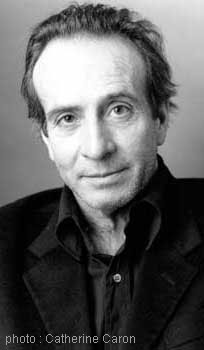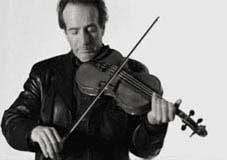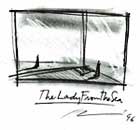
Michael
Galasso Music composer film music theater music dance music violin virtuoso concerts performances contact : |
| english |
Composer,
violinist and musical director Michael Galasso was born in Hammond,
Louisiana in 1949, to a concert violinist father and an oboist
mother. He began studying the violin at the age of 3 and had
his solo debut performing Vivaldi’s Concerto in A minor
with the New Orleans Philharmonic at age 11. Galasso continued
his studies at Oberlin and Dartmouth Colleges.
A musician of classical formation influenced by his encounter with John Cage at the age of 18, born in the land of jazz, rock and rhythm n’blues, author for theater, cinema, dance and sound installations, this violin virtuoso has been experimenting for 30 years on a melodical and rhythmical synthesis in which his affinities with Baroque music are entwined with his American heritage as well as with Iranian and central Asia traditions. Michael Galasso began his career composing music for Robert Wilson's "Ouverture"(1972), "The Life and Times of Joseph Stalin" (1973), "A Letter for Queen Victoria" (1974-5), and "The $ Value of Man" (1975). Also with Wilson, he has written the score for Ibsen's "Lady from the Sea" (1998), Strindberg's "A Dreamplay" (1998), voted the best foreign theater production for the 1999-2000 season by the French Theater and Music Critics Society after a performance in Paris in March 2000 at the Theatre National de Chaillot, Chekhov’s "Three Sisters" (2001), and for the theatrical version of Mayer, Janowitz and Wiene's silent film, "The Cabinet of Doktor Caligari" (2002). In 2004, Wilson and Galasso collaborated on “Les Fables de La Fontaine” for the Comédie-Française, which premiered January 30, 2004 in Paris and has been an enormous critical and public success. Other recent Wilson scores include “Peer Gynt” in Oslo and Bergen, Norway, “2 Lips and Dancers in Space” with the Nederlands Dans Theater in Luxembourg, and “Quartett” starring Isabelle Huppert, which premiered in Paris and toured to Berlin, Geneva, Milan, Athens, and soon New York. Galasso’s film scores include Wong Kar-Wai’s “Chunking Express” and “In the Mood for Love,” Martin Provost’s “Seraphine,” Babak Payami’s Iranian film “Secret Ballot” , American director Ido Mizrahy's "Things that Hang from Trees", Tajikistan’s Djemsjed Osmonov’s “Angel on my Right Shoulder,” Sam Gabarski’s “The Tango Rashevski, "Brodeuses" by Eleonore Faucher, ” Darvish Zaim’s Turkish film, “Çamur” (Mud), Mariana Otero’s documentary “Histoire d’un Secret,” and “Ella Es El Matador” by Spanish directors Gemma Cubero and Celeste Carrasco. Galasso also made numerous sound/music installations, including the Giorgio Armani Retrospective at the Guggenheim Museum in New York in 2000 - the first sound installation in the New York Guggenheim's history - and the Guggenheim Bilbao in 2001. Subsequently the exhibition has traveled to the Neue National Galerie in Berlin, followed by London’s Royal Academy of Arts, and Rome at the Terme Diocleziano. Other sound installations include the Swiss EXPO 2002, and the Basilique de Saint-Denis in Paris. Michael Galasso has also written and performed music for choreographers Karole Armitage, Andy DeGroat, and Lucinda Childs. Michael Galasso’s second album for ECM Records, “High Lines”, was released in March 2005, and in 2008 Galasso performed a solo concert at the Teatro Romano in Spoleto Italy, described by New York Times critic Daniel Wakin as a “a tour de force of stamina and harmonic invention.” On February 27, 2009, the Cesar for best original score was awarded in Paris to an American composer, Michael Galasso, for the film Seraphine. On September 9th, 2009 Michael Galasso passed away in his home in Paris, France. His music will stay alive and available for film directors, theater directors, choreographers, visual artists, etc. The complete archive of his recordings is well guarded and contains numerous projects and compositions that have never been published before. Contact for any further informations or requests will be : For information on upcoming performances, concerts, and film scores, visit : http://michaelgalasso.blogspot.com/ |
      |
| française |
Compositeur, violoniste et chef
d’orchestre, Michael Galasso est né à Hammond,
en Louisiane, en 1949, d’un père violoniste et chef
d’orchestre et d’une mère experte du haut-bois. Il
commença à jouer du violon à l’âge
de trois ans, et débuta en soliste à l’âge
de onze ans, avec le Concerto de Vivaldi en Do mineur, avec la
New Orleans Philarmonic. Il poursuivit sa formation à Oberlin
et à Dartmouth College.
|
       |
| press quotes |
Spoleto,
Italy: A Lone Violinist at the Teatro Romano
Born in Louisiana, Mr. Galasso now lives in Paris. He collaborates frequently with directors and choreographers. At times, he sounded like a demented player of Bach partitas gone all Philip Glass, with occasional hints of bluegrass and Eastern flavors. Some stretches of material sounded classical, like the up and down chords of a Beethoven violin concerto cadenza. The repeated figures seemed to have between 12 and 18 notes each, and frequently changed color subtly, like a slowly turning kaleidoscope. Sometimes they were as fast as 32nd-notes, or slow as 8th-notes, with a metronome beat of, say, 60. His beat was rock steady and intonation solid. There was something hypnotic about it, like listening to Sufi music in a Western cast. -- Daniel J. Wakin, The New York Times In the Mood for Love
“… The musical score is
a waltz, whirling without ever letting the melody get close
to a logical ending, just as the couple does (…) in the
Mood for Love is precisely, thoroughly inscribed in the time
of the world.” Giorgio Armani Exhibition (Guggenheim
Museum)
" ...A collage of religious and
exotic sounds, created by Michael Galasso, amplifies the Eastern
mood. Chanter? (...) Plan to be there when Mr. Galasso's soundtrack
segues into sitar music. You do not need spiritual austerities
to enter into a contemplative state: here every possible organic
and geometric shape seems to rise up from a cosmic soup, then
dissolve back into it."
" And Indra's Daughter (....) descends
as if down a banister into a world of chill blue-grey light,
and the fragile echoes of period instruments. Michael Galasso's
score, played on viol de gamba, baroque cello, theorbo, marimba,
beguilingly recreates in its neo-baroque minimalism, the repetitions,
the ostinati, the themes and variations of the play and of
the production."
" ...(...) Nothing else is there.
Except, though, the only real winner of this prestigious international
match involving four players: the marvelous musical score by
Michael Galasso."
" Virtuoso violinist and conductor
Michael Galasso's "Scene VI" joyously brings together
pizzicato, bowed noted notes, inflexions and strange glissandi
- like a fantastic dream evoking an imaginary Orient." |
| listen |
listen to excerpts
:
Michael Galasso on CD
|



